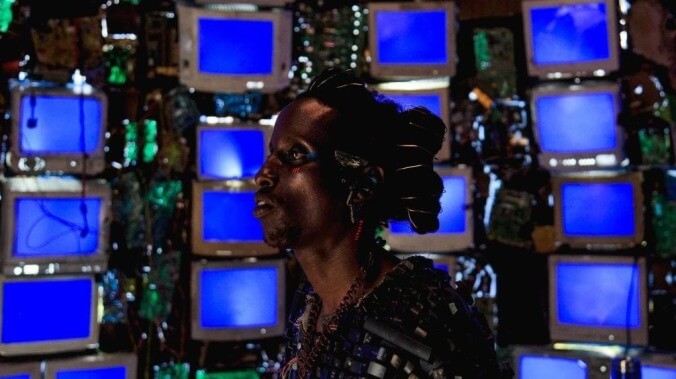Neptune Frost features bold colors—and bolder ideas
Co-directors Saul Williams and Anisia Uzeyman create a mesmerizing, metaphorical sci-fi musical
Film Reviews Neptune Frost
When a film includes characters named Memory, Psychology, Tekno, Elohel (that one took a minute), and then its heroes assume the handle of MartyrLoserKing, one should expect a story working in metaphor. Neptune Frost, written, composed, and co-directed by poet-musician Saul Williams and actress/director Anisia Uzeyman, is a low-budget science-fiction musical shot in Rwanda, set in an unknown time (“after the war”) and in an unknown place rich in minerals, slave labor, discarded technology, and some extraordinarily clever info crunch costumes. There’s little about it that is realistic, but it has points to make about the real world.
While the film is certainly engrossing, you should not expect action-adventure. It’s got more of a Godspell vibe, with its band of outsiders working toward change led by an intersex hacker called Neptune (played alternately by Elvis Ngabo and Cheryl Isheja) and Matalusa, a runaway miner whose brother (the aforementioned Tekno) was killed in the quarries for taking a moment to have an almost Uncut Gems-ish mind meld with a particularly inspiring hunk of coltan.
Neptune Frost’s plot, such as it is, is very much secondary to the theatrical vibe, and the beat-driven musical numbers. Most of the dialogue and lyrics are in Kinyarwanda, Kirundi, Swahili, and French, with the exception of a loud “Fuck you, Mr. Google!” in English. Even with subtitles, though, there’s some sci-fi speak among the story’s inhabitants, with unusual phrases like “shining” and “unanimous goldmine” working as greetings.
But for every typical adventure trope, like force fields appearing periodically as our characters are on the run, there’s an unfamiliar poli-sci element, like a spirit glowing under blacklight urging our heroes to “hack … hack into land rights and ownership … hack into business law, proprietorship … hack into the history of the bank … hack … and question the business of slavery, of free labor, its relation to today’s world.” Not since Zabriskie Point has psychedelia and Marxism worked together so effectively on screen.
There are interludes in a kind of computer mainframe vinculum, in which derelict DOS-era monitors and wires resemble a human circulatory system. (It would come as no surprise to learn if Williams and Uzeyman were inspired by sculptures from the recently departed multidisciplinary artist Milford Graves.) The band of rebels eager to disrupt oppression dress with breastplates of discarded hard drives and cool jackets with black desktop computer keys as a kind of chain mail. This, plus the bold colors associated with East Africa, shown in costumes and makeup, make for an overall buoyant look.
But Neptune Frost doesn’t just dazzle within the frame. As our paired heroes meet (and fall in love? That part is not as germane to the story as you might think) and prepare to to bring justice to “The Motherboard,” the extremely video-looking sheen of the movie’s capture sizzles, scratches, and weaves into images that aren’t just typical HD glitches, but graphic explosions of color and sound. (This is where audience members are invited to either lean further forward and go with the flow, or throw up their hands and ask “Uh, what the hell am I looking at here?”)
Neptune Frost began a graphic novel, then as a musical, then as three albums produced by Williams under the MartyrLoserKing handle. The film boasts Lin-Manuel Miranda and Fela! producer Stephen Hendel as executive producers. It is also the first narrative feature from Knitting Factory Entertainment, best known for its legendary genre-smashing New York City concert venue and avant-garde record label. In short, there’s a hell of a lot that’s cool about this thing.
Oh, and the Frost of the title is a large white-and-red bird that gets a few in-flight close-ups, but is quite obviously just being held by someone moving in sync with the camera. It’s handmade elements like that which makes Neptune Frost more than just the recitation of post-colonial tracts and cool music, but a spirited, one-of-a-kind film worth checking out.
14 Comments
Its nice to see Black film getting some love… I’ve seen the film, I’d say this review is generous. I’m to afraid to critique it, because I’m afraid to be labeled a racist.B+ a classic…
I’m to afraid to critique it, because I’m afraid to be labeled a racist.Oh fuck off you concern troll.
Elohel (that one took a minute)Maybe the Vyvanse hasn’t kicked in yet, but I’m still not getting it…?
I am laughing out loud at your inability to decipher it. It only took me about twenty minutes.
Elohel= El-Oh-El=LOL (I think?)
I mean I guess, but if so then there shouldn’t be an H
Shouldn’t be? You know it’s a work of fiction.
RDRR
El-oh-el.
some extraordinarily clever info crunch costumesWhat the hell does this even mean
It’s the future. By the time you figure out what it means, it will mean something else. That’s probably what it means, come to think about it. I mean, what does anything mean any more?
it’s obviously a little poetic, but the words are meant to evoke the theme of low fi info tech hardware. it’s a similar term to bitcrush which is a distortion effect that evokes the timbre of music produced on older computer hardware (aka chiptunes)but the descriptions of those costumes (pc keys, hard drives) are also provided for those who prefer things spelled out
I guess an up its own ass and high on the its own farts movie deserves an up its own ass and high on the its own farts review.
Saw the trailer awhile back, glad to hear it’s along the lines I expected. I really want to see this.